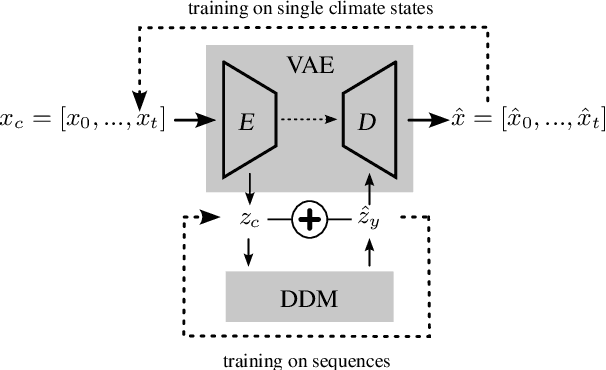Thomas Ludwig
Field-Space Autoencoder for Scalable Climate Emulators
Jan 21, 2026Abstract:Kilometer-scale Earth system models are essential for capturing local climate change. However, these models are computationally expensive and produce petabyte-scale outputs, which limits their utility for applications such as probabilistic risk assessment. Here, we present the Field-Space Autoencoder, a scalable climate emulation framework based on a spherical compression model that overcomes these challenges. By utilizing Field-Space Attention, the model efficiently operates on native climate model output and therefore avoids geometric distortions caused by forcing spherical data onto Euclidean grids. This approach preserves physical structures significantly better than convolutional baselines. By producing a structured compressed field, it serves as a good baseline for downstream generative emulation. In addition, the model can perform zero-shot super-resolution that maps low-resolution large ensembles and scarce high-resolution data into a shared representation. We train a generative diffusion model on these compressed fields. The model can simultaneously learn internal variability from abundant low-resolution data and fine-scale physics from sparse high-resolution data. Our work bridges the gap between the high volume of low-resolution ensemble statistics and the scarcity of high-resolution physical detail.
(R)evolution of Programming: Vibe Coding as a Post-Coding Paradigm
Oct 14, 2025Abstract:Recent advancements in generative artificial intelligence (GenAI), particularly large language models, have introduced new possibilities for software development practices. In our paper we investigate the emerging Vibe Coding (VC) paradigm that emphasizes intuitive, affect-driven, and improvisational interactions between developers and AI systems. Building upon the discourse of End-User Development (EUD), we explore how VC diverges from conventional programming approaches such as those supported by tools like GitHub Copilot. Through five semi-structured interview sessions with ten experienced software practitioners, we identify five thematic dimensions: creativity, sustainability, the future of programming, collaboration, and criticism. Our analysis conceptualizes VC within the metaphor of co-drifting, contrasting it with the prevalent co-piloting perspective of AI-assisted development. We argue that VC reconfigures the developers role, blurring boundaries between professional and non-developers. While VC enables novel forms of expression and rapid prototyping, it also introduces challenges regarding reproducibility, scalability, and inclusivity. We propose that VC represents a meaningful shift in programming culture, warranting further investigation within human-computer interaction (HCI) and software engineering research.
Latent Diffusion Model for Generating Ensembles of Climate Simulations
Jul 02, 2024



Abstract:Obtaining accurate estimates of uncertainty in climate scenarios often requires generating large ensembles of high-resolution climate simulations, a computationally expensive and memory intensive process. To address this challenge, we train a novel generative deep learning approach on extensive sets of climate simulations. The model consists of two components: a variational autoencoder for dimensionality reduction and a denoising diffusion probabilistic model that generates multiple ensemble members. We validate our model on the Max Planck Institute Grand Ensemble and show that it achieves good agreement with the original ensemble in terms of variability. By leveraging the latent space representation, our model can rapidly generate large ensembles on-the-fly with minimal memory requirements, which can significantly improve the efficiency of uncertainty quantification in climate simulations.
 Add to Chrome
Add to Chrome Add to Firefox
Add to Firefox Add to Edge
Add to Edge